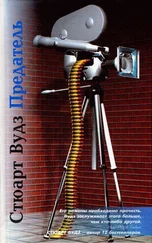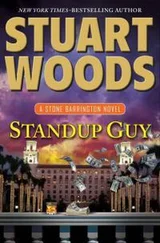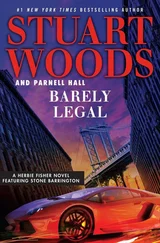“Tell me one.”
“How about diarrhea and vomiting?”
“Too unattractive, and still a lie.”
“Intestinal difficulties.”
“Same thing.”
“Exhaustion.”
“Well, I’m certainly getting tired of talking about this.”
“How about the FBI and the Secret Service made you do it.”
“Which one?”
“Both of them?”
“Reason?”
“Because the president is in town for four events, and they’re spread too thin to cover everything.”
“Well, that has the attraction of being true.”
“Can you hang on a minute?” He didn’t wait for an answer, just called Tom Blake.
“Is Bill with you?”
“Yes.”
“How about postponing both events for a day. Can you cover both the day after tomorrow?”
“Yes!”
“Hang on.” He sent back to Holly. “We’ve got it, it’s true, and it works.”
“What does?”
“Postponing both events for a day.”
“Oh, hell, all right. But they’re making the phone calls, not I.”
“Done.” Stone hung up. “You still there?”
Both of them said, “Yes.”
“Postpone until the day after tomorrow, and you two have to make the calls. Flip a coin.”
“Great idea!” Tom said. “We’ll confirm!”
“And Tom, Bill?”
“Yes?”
“If that doesn’t work, reschedule them for different days, maybe next week, and clear it with the transition team.”
“Okay.”
Stone put down the phone and pondered the thought that it could be like this for the next eight years.
Shortly after five, Holly walked into his study, grabbed a bourbon bottle, got some ice, and poured. “You’re in big trouble,” she said.
“Bourbon, please,” Stone said, looking up from the TV.
A CNN anchorperson came on. “It seems that events scheduled for tomorrow by both the president and the president-elect have overstretched the limits of protection that can be provided for them, so the president-elect’s events at St. Mary’s College and the Army Intelligence Center, in New Jersey, have had to be canceled and rescheduled for another time.”
“I guess the president takes precedence,” his coanchor added.
Stone switched off the TV. “There, that wasn’t so bad,” he said.
“It wasn’t, but you’re still in trouble.”
“Why?”
“Because neither event could be rescheduled before January 20.”
“That is my fault, how?”
“Well...”
“Look at it this way: you don’t have to go to New Jersey tomorrow and drive back during rush hour.”
She sat down and kissed him. “Maybe you’re not in such big trouble after all.”
Bess, watching the local news, learned that both of Holly Barker’s events had been canceled. Shortly, Sykes called and invited her for a drink at 6:30, dinner to follow. She appeared on time, wearing her new little black dress and her pearls.
When Sykes opened the door, Bess saw Eugene having a drink but, thankfully, he was not dressed for dinner. The TV was on, and Sykes went to turn it off.
“Can you leave it on?” Bess asked. “I like Lester Holt.”
“Of course.” He made her a drink and sat down next to his own. “How was your shopping day?” he asked.
“Just about perfect,” she said. “I bought this dress, some trousers, and some silk blouses.” She handed the Amex card to him. “Thank you.” She squeezed an earring and turned on the pearls.
Lester Holt came on, read a couple of national stories, then said that Holly Barker’s events had been canceled for the next day and why.
“Well,” Eugene said, “that’s one decision you don’t have to make, Colonel.”
“I guess we’ll have to pick a new event when her next schedule is made up. We may be in New York for a few more days.”
“Just out of curiosity,” Eugene said, “which event did you decide on?”
“The one in New Jersey,” Sykes replied. “We’re both more comfortable in that environment than at an artsy-fartsy college.”
“So true,” Eugene said.
“What sort of event do you need?” Bess asked.
“Something like the two that were canceled. One will turn up, don’t worry. She’s a politician, she can’t hole up for long. She’s got to be seen and see people. She’s already running for reelection.”
“How can I help?” Bess asked.
“By enjoying yourself while you’re in the big city,” Sykes replied. “If we need you for something, I’ll let you know.”
“She needs to leave the transition office now and then, if only to go home for the night,” Eugene said.
“She’s staying at the Carlyle, which is on East Seventy-sixth Street. That block is congested because of the hotel entrance, and it’s not good for us. I believe you and the boys have tickets to see the Knicks play tonight?”
“Right you are.” Eugene stood up. “I’d better get going.”
“Should we move on, too?” Bess asked.
“Our table’s not until eight o’clock, and we have another guest coming for drinks.”
“Anybody I know?”
“We’ll see.”
Bess was immediately nervous. What if it really was somebody she knew, or who knew her? There was a knock on the door.
Sykes opened it to admit a room-service waiter with a tray of canapés. He put them on the coffee table, accepted a tip, and left.
They watched another couple of minutes of news, and there came another knock.
Sykes got up and heartily greeted a man at the door. “Bess,” he said, “this is United States senator Les Hardy,” he said. “Les, this is Bess Potts.”
Hardy, a tall, well-tailored man, greeted her with charm and compliments on her dress and pearls.
“Thank you, Senator,” she replied.
“Please, it’s Les. I’m only just getting used to the title.”
Bess recalled that the senior senator from Virginia had died a few weeks before, and that the governor had appointed Hardy, who only recently had been sworn in, to the vacant seat.
They finished a couple of drinks and left the hotel for dinner.
“Where are we dining?” Bess asked.
“At La Goulue, just down the street. We’ll walk.”
Fisk and Tom Blake listened to the transmitted conversation. “Well, there’s a wild card for you,” Tom said. “I had no idea that Sykes and Hardy were tight.”
Fisk did a little work on Google. “They were classmates at West Point,” he said, “and roommates their senior year.” He scrolled down. “Their paths crossed on a couple of assignments, too: one in Germany and one in Florida.”
“What did Hardy do as a civilian?”
“He retired from the Army last year as a colonel, and became a part-time lobbyist for a gun manufacturer. The Army was a big customer, and he was a big contributor to the governor.”
“Does he have any ties to any right-wing organizations?” Tom asked.
Fisk checked. “Only ones listed are a club in Washington and the NRA.”
La Goulue was crowded and noisy. Bess wondered how that was going to affect the performance of her wire. There was nothing she could do about it, except lean in for conversation, so she decided to relax and listen.
“Pity about those schedule changes,” Hardy said to Sykes, after they had ordered dinner.
“We’ll have other chances,” Sykes said, “as long as your friend keeps the information flowing.”
God, Bess thought. I hope my colleagues heard that.
Tom Blake and Fisk were listening intently on earphones.
“Did you understand that?” Tom asked.
“I heard it, but I’m not sure I understood it,” Fisk replied. “What information?”
“About Barker’s schedule, I think. Can you clean up some of the crowd noise on this audio?”
Читать дальше












